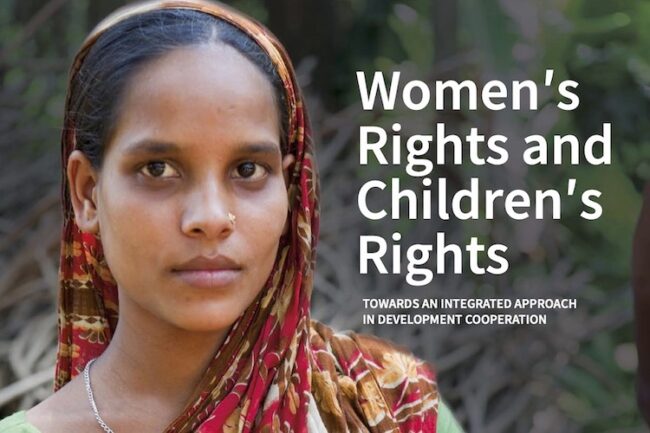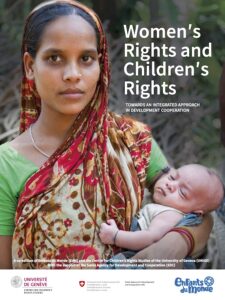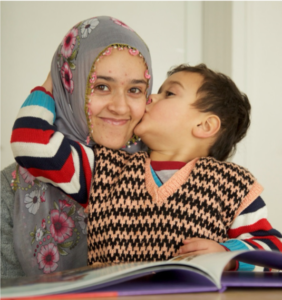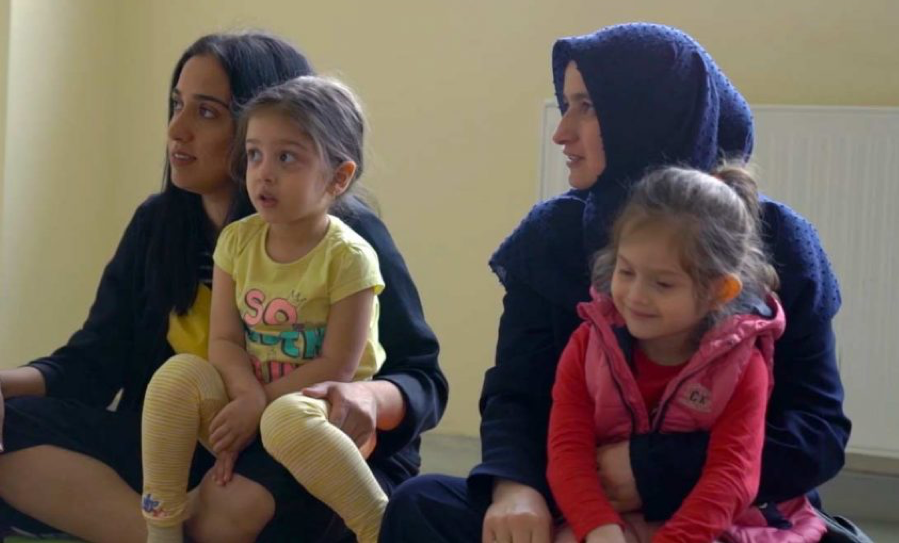Women’s Rights & Children’s Rights – developing synergies, minimizing tensions
12.10.21
MMM has contributed to a newly released book on this theme.

Co-edited by Enfants du Monde Suisse (EdM) and the Centre Interfacultaire en Droits de l’Enfant of the University of Geneva (UNIGE), Women’s Rights and Children’s Rights – Towards an Integrated Approach in Development Cooperation has its origins in a workshop organised in 2019 on the occasion of the 30th anniversary of the Convention on the Rights of the Child with the theme Children’s rights and women’s rights – fields of tension or synergies?
The lives of children and women are strongly intertwined, often through interdependent relationships. Yet women and children’s rights are frequently dissociated in legislation and policy, and in development programs.
 The book seeks to answer some key questions:
The book seeks to answer some key questions:
- How to position oneself as an actor of international cooperation in relation to social issues that concern and at the same time address the protection and promotion of children’s rights and women’s rights, or even other rights?
- How to resolve or better anticipate possible tensions?
- How to create synergies?
The book is divided into two parts: an analysis of the tensions and synergies that can be observed between children’s rights and women’s rights; and a case study section presenting examples of good practices from programs implemented in development cooperation.
It is to this second part that MMM has contributed in collaboration with ACEV, a Turkish NGO that develops and implements child development support programmes, and which like MMM is a member of the Early Childhood Peace Consortium.
MOCEP – An example of good practice
The book provides the good practice example of MOCEP (Mother and Child Education Programme), the early childhood education support program developed by ACEV. It targets mothers and pre-school children living in disadvantaged areas, an initiative successfully implemented in Turkey, as well as in some fifteen other countries around the world.
 The example of MOCEP shows the impact that early childhood development support programs can have not only on the child, but also on the mother, and on the whole family and community environment:
The example of MOCEP shows the impact that early childhood development support programs can have not only on the child, but also on the mother, and on the whole family and community environment:
- Improved cognitive and social skills of children, who also gain confidence and are more attentive to others
- Reduced conflict and violence in families – through positive discipline, better mother-child relationships
- Increased empowerment of women, who also gain confidence and feel more valued
- An impact that extends beyond the mother-child relationship: better relationship within the couple, and even between the father and the children
Given these positive outcomes, the program is a perfect example of existing synergies between children’s rights and women’s rights.
However, from a women’s rights perspective, this type of programme has two drawbacks:
- It increases the mother’s educational workload – i.e. the unpaid work of caring
- It reinforces gender stereotypes about a woman’s place in the home, i.e. the idea that it is “normal” or even “natural” for a woman to look after the children.
To resolve these tensions, it is important to involve fathers, if possible at a level comparable to that of mothers.
Conclusion
The MOCEP initiative shows that considering the family environment and supporting parents, especially mothers, including parenting education, is absolutely essential for the realisation of children’s rights
Moreover, in reality, most mothers experience on a daily basis this tension between children’s rights (to be raised by their parents and to develop harmoniously) and women’s rights (to have an active life outside the home).
Mothers too often end up having to make ‘choices’ – that often are not real choices, but rather compromises and sacrifices – such as reducing the amount of time they spend in paid work, giving up careers, politics, etc… the direct consequence of these ‘choices’ is that mothers are too often economically and socially penalised.
Resolving this tension between children’s rights and women’s rights is therefore fundamental to both progress on gender equality, and to the realisation of children’s rights – therefore for the future of our societies.

Photos MOCEP – Courtesy of ACEV
The New EU Gender Equality Roadmap : A Call for Inclusion of Mothers
04.03.25
The European Commission’s initiative on a new Gender Equality Roadmap post-2025, marks a significant step forward in addressing gender disparities across the European Union. Make Mothers Matter (MMM
Breaking the Cycle: Gender Equality as a Path to Better Mental Health
18.03.25
The Council of the European Union has taken a decisive step in recognising the vital connection between gender equality and mental health.
Europe Must Listen to Mothers: Our landmark report heads to the European Parliament
28.08.25
On 22 September 2025, the voices of mothers will take centre stage in Brussels. For the first time, Make Mothers Matter (MMM) will present its State of Motherhood in Europe








